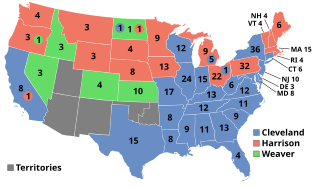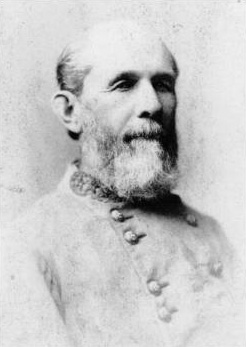
The 1892 United States presidential election was the 27th quadrennial presidential election, held on Tuesday, November 8, 1892. In the fourth rematch in American history, the Democratic nominee, former president Grover Cleveland, defeated the Republican incumbent, President Benjamin Harrison. Cleveland's victory made him the first and, to date, the only person in American history to be elected to a non-consecutive second presidential term. It was also the first of two occasions that incumbents were defeated in consecutive elections—the second being Gerald Ford's loss to Jimmy Carter in 1976, followed by Carter's loss to Ronald Reagan in 1980.

The 1896 United States presidential election was the 28th quadrennial presidential election, held on Tuesday, November 3, 1896. Former Governor William McKinley, the Republican nominee, defeated former Representative William Jennings Bryan, the Democratic nominee. The 1896 campaign, which took place during an economic depression known as the Panic of 1893, was a political realignment that ended the old Third Party System and began the Fourth Party System.

Lucius Quintus Cincinnatus Lamar II was a Confederate soldier, American politician, diplomat, and jurist. A member of the Democratic Party, he represented Mississippi in both houses of Congress, served as the United States Secretary of the Interior, and was an associate justice of the Supreme Court of the United States. He also served as an official in the Confederate States of America.

The People's Party, also known as the Populist Party or simply the Populists, was an agrarian populist political party in the United States in the late 19th century. The Populist Party emerged in the early 1890s as an important force in the Southern and Western United States, but collapsed after it nominated Democrat William Jennings Bryan in the 1896 United States presidential election. A rump faction of the party continued to operate into the first decade of the 20th century, but never matched the popularity of the party in the early 1890s.

Comer Vann Woodward was an American historian who focused primarily on the American South and race relations. He was long a supporter of the approach of Charles A. Beard, stressing the influence of unseen economic motivations in politics.

Thomas Edward Watson was an American politician, attorney, newspaper editor, and writer from Georgia. In the 1890s Watson championed poor farmers as a leader of the Populist Party, articulating an agrarian political viewpoint while attacking business, bankers, railroads, Democratic President Grover Cleveland, and the Democratic Party. He was the nominee for vice president with Democrat William Jennings Bryan in 1896 on the Populist ticket.
Black Populism was a broad-based, independent political movement started by African Americans following the end of the Reconstruction era. The movement began among Black agricultural workers as a response to Jim Crow laws. They sought better pay and labor protections, increased funding for Black schools, criminal justice reform, and increased participation of African Americans in politics.

Oxford College of Emory University is a residential college of Emory University. Oxford College is located in Oxford, Georgia, on Emory University's original campus 38 miles (61 km) east of Emory's current Atlanta campus. It specializes in the foundations of liberal arts education. Students who enroll in Oxford College complete an associate of the arts degree there, after which they can continue their studies at Emory's Atlanta campus to pursue a bachelor degree without any additional applications.

William Jonathan Northen, was the 54th Governor of Georgia from 1890 to 1894, as well as a leading Baptist minister. Northen was president of the Georgia Baptist Convention from 1892 to 1910, and president of the Southern Baptist Convention from 1899 to 1901. His political rhetoric was based on his religious outlook, and often focused on racial issues at a time when lynching was increasing. Northen believed that advances in medicine and health would ultimately help African Americans achieve salvation. He promoted the ideology of the modernizing New South, but did not abandon the policy of white supremacy.

Allen Daniel Candler, was a Georgia state legislator, U.S. Representative and the 56th Governor of Georgia.

William Tatum Wofford was an officer during the Mexican–American War and a general in the Confederate States Army during the American Civil War.

Grosgrain is a type of fabric or ribbon defined by the fact that its weft is heavier than its warp, creating prominent transverse ribs. Grosgrain is a plain weave corded fabric, with heavier cords than poplin but lighter than faille, and is known for being a firm, close-woven, fine-corded fabric. Grosgrain has a dull appearance, with little luster in comparison to many fabric weaves, such as satin, often used for ribbons; however, it is comparatively very strong. Grosgrain fabric is most commonly available in black, but grosgrain ribbon comes in a large variety of colors and patterns. The ribbon is very similar to Petersham ribbon in its appearance, but it does not have the ability to follow the curves of a surface or edge the way that the latter does.

Andrew Warren Sledd was an American theologian, university professor and university president. A native of Virginia, he was the son of a prominent Methodist minister, and was himself ordained as a minister after earning his bachelor's and master's degrees. He later earned a second master's degree and his doctorate.
Amalia K. Amaki is an African-American artist, art historian, educator, film critic and curator who recently resided in Tuscaloosa, Alabama, where she was Professor of Modern and Contemporary Art at the University of Alabama at Tuscaloosa from 2007 to 2012.

Mildred Seydell was an American pioneering journalist in Georgia. Seydel wrote as a syndicated columnist and founded the Seydell Journal, a quarterly journal that was the successor to The Think Tank a short-lived biweekly journal of poetry, articles and reviews (1940–1947). She also founded the Mildred Seydell Publishing Company, and was a regular on the lecture circuit.

The 1896 United States presidential election in Georgia took place on November 3, 1896, as part of the wider United States presidential election. Voters chose 13 representatives, or electors, to the Electoral College, who voted for president and vice president.

The 1892 United States presidential election in Georgia took place on November 8, 1892, as part of the wider United States presidential election. Voters chose 13 representatives, or electors, to the Electoral College, who voted for president and vice president.

The 1892 United States presidential election in Louisiana took place on November 8, 1892. All contemporary 44 states were part of the 1892 United States presidential election. State voters chose eight electors to the Electoral College, which selected the president and vice president.

「」

United States gubernatorial elections were held in 1892, in 32 states, concurrent with the House, Senate elections and presidential election, on November 8, 1892.

















